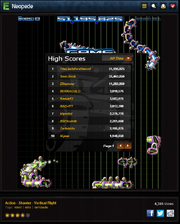Quantum cognition[]

One of my scores on the _Neopede_ Dynamic Q test.
If we design questions to be asked of a number of human beings, can these questions establish the speed, power, depth, breadth, etc. of human mental capabilities, especially with an aim to establish the computational limits of human intelligence, in terms of the quantum features necessary? Can such experiments establish definitively the nature of the underlying structures which allow these levels of computational strength?
If we find that the conventional view of brain complexity is sufficient to these performances, (searching far afield for exceptional capabilities) then we would have strong evidence that the brain is largely conventional in its processes. If, however, we find a computational strength which is beyond our capability to explain using the conventional view, we would then be forced to take the Quantum Mind hypothesis somewhat more seriously, despite the difficulties it currently faces.
Tests for such capabilities could be either static (answer a set of questions) or dynamic (facing a set of functional challenges in real-time [such as a video game, perhaps? P:D ] ). Both approaches would require that the fundamental skills and meanings of the challenge domain be well-mastered before any serious testing could begin, but considering the value of the knowledge of human information processing to be gained, truly staggering investments of time, effort, and money would seem to be well justified!
Apparently SOMEONE has been paying attention, or at least thinking along roughly the same lines (albeit in a slower and less intuitive way) P;D Check these out!
Quantum Measurement and Manipulation Group, Aarhus University
Quantum Games article at Phys.org